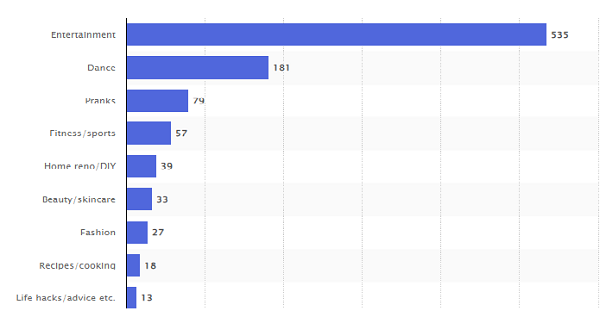As more US states move to ban TikTok on government-owned devices, and politicians weigh accusations that the app has been used to spy on US journalists, TikTok’s parent company ByteDance is reportedly willing to make significant concessions in its deal with US officials, as it works to avoid a ban in the region.
ByteDance has been working with the Committee for Foreign Investment in the US (CFIUS) for months, in order to establish terms of a deal that would enable TikTok to continue operating in the US, with talks primarily focused on data storage, and limiting access to US user data by China-based ByteDance employees. That arrangement would see TikTok partnering with Oracle on a local storage center for US users – but more recently, additional concerns have arisen as to how TikTok’s algorithm functions, and how that too could be used to manipulate users in the app.
On this front, ByteDance is now proposing a new element of the deal, which would see a reorganization of the company’s US operations, as well as new measures for algorithmic transparency, enabling greater oversight, and even control, from American authorities.
As reported by The Wall Street Journal:
“The talks with US officials and lawmakers have become more urgent for TikTok in recent months as federal and state politicians have made moves to ban the app on government-issued devices. TikTok is hoping that details of its planned reorganization – and promised measures to ensure oversight of its content-recommendation algorithms – will convince potential allies in Washington of its ability to operate independently of its parent company, China-based ByteDance Ltd.”
This isn’t the first time that TikTok has proposed more algorithmic transparency.
Back in 2020, TikTok announced plans to open a new transparency center in LA as part of its ongoing effort to distance itself from concerns around potential Chinese Government interference. This is now an element of the negotiations underway, with the view being that by providing more insight into its operations, that will reassure US officials as to what’s happening in the app, what’s being amplified and/or demoted, and whether external voices have influenced such.
Indeed, according to WSJ, past incidents of suppression have raised even more concerns among US officials.
“In 2020, US TikTok executives noticed views for videos from certain creators about the US presidential election were mysteriously dropping 30% to 40%, people familiar with the episode said. When those executives asked their bosses in China, they found that TikTok’s algorithm team had tweaked certain aspects of the type of content shown on the app to play down political conversations about the election, and this had inadvertently buried the videos of a range of users, the people said.”
This type of manipulation, stemming from China, is a major element of concern for US officials. And when you combine that with the aforementioned monitoring of US journalists through the app, you can see how this has been amplified, which could result in a full ban of the app.
But maybe, by providing more transparency, that could be a way forward, which would keep TikTok in operation in the US.
But there’s also this:
“In the new proposed arrangement, according to the people familiar with it, third-party monitors would check the code for the video-recommendation algorithms to detect whether it has been manipulated or if the Chinese government or other foreign actors have had access. Provisions in the proposal stipulate that if the US government or the third-party monitors see anything that concerns them, there would be a process to flag the issues to TikTok, and ultimately to the US government if necessary.”
This could be a concerning development, as it would effectively enable US officials to also have some input into TikTok’s algorithmic process, and to potentially influence what the app shows, or doesn’t show users, based on their assessment.
Which seems very similar to how the CCP dictates how Chinese-based companies operate their algorithmic systems – and it’s interesting, within this broader proposal, to consider how much, exactly, the CCP already influences in-app trends, and how that could relate to the same proposal in the US.
For example, on Douyin, the Chinese version of the app, the top trends include ‘Positive Energy’ and ‘Knowledge Sharing’, which, reportedly, is due to the CCP influencing what’s popular on the platform, and what gets the most promotion and reach.

The idea is that the Chinese Government wants Douyin to encourage positive and beneficial behaviors, so it’s exerted a level of influence over the platform to put more focus on this type of content over other, less savory, and less beneficial trends.
Which is especially interesting when you consider the top trends on TikTok in the US.

What if, with its newfound powers of algorithmic manipulation, the US Government sought to push for the same, and reduce the emphasis on pranks and dancing clips, in order to instead highlight more positive elements of the community, and encourage more beneficial behaviors among the youth?
That could be a positive, but then again, that would also be overstepping the bounds of what, at least in theory, this proposal is about.
But that could be where things are headed – if ByteDance looks to give US officials a say over the content that gets more traction in the app, that could lean more into the Chinese model for Douyin, where officials, reportedly, hold significant sway over all aspects of the app’s operations.
Would ByteDance go that far, in order to stay in operation in the US?
We’re now up to 27 US states that have banned TikTok on Government-owned devices, and as the pressure mounts, ByteDance is seemingly exploring more drastic measures to keep the app running.
One thing’s for certain, TikTok’s in for some significant changes over the coming months.



